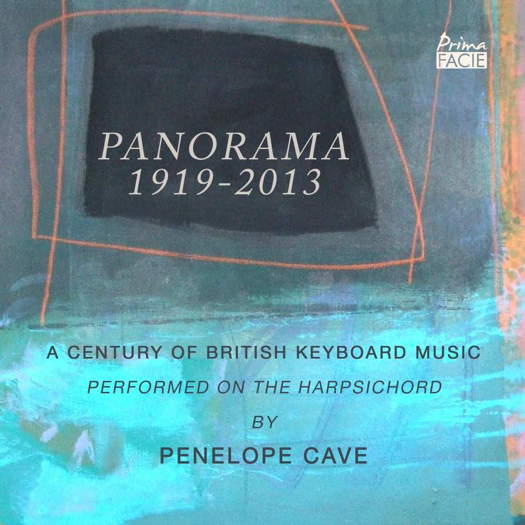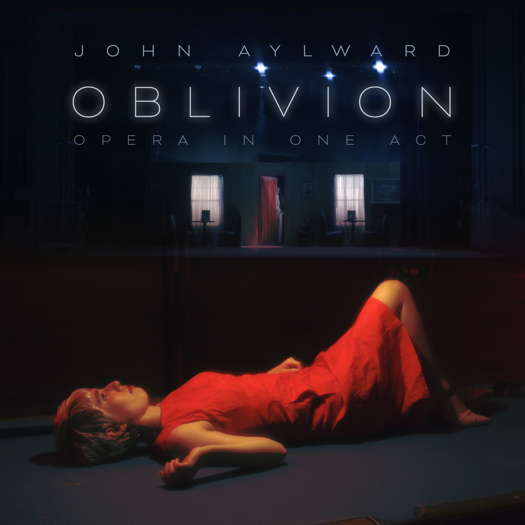 SPONSORED: CD Spotlight. A Fantastic Collection. Penelope Cave Panorama CD. Little-known harpsichord gems, strongly recommended by Alice McVeigh.
SPONSORED: CD Spotlight. A Fantastic Collection. Penelope Cave Panorama CD. Little-known harpsichord gems, strongly recommended by Alice McVeigh.
All sponsored features >>
- Catharine Crozier
- Robert Lucas de Pearsall
- Giovanni Battista Martini
- Akiko Ohtomo
- Gabriel Pierné
- aleatoric music
- Esdras Mugatic
- Rosamunde String Quartet
 DISCUSSION: What is a work? John Dante Prevedini leads a discussion about The performing artist as co-creator, including contributions from Halida Dinova, Yekaterina Lebedeva, Béla Hartmann, David Arditti and Stephen Francis Vasta.
DISCUSSION: What is a work? John Dante Prevedini leads a discussion about The performing artist as co-creator, including contributions from Halida Dinova, Yekaterina Lebedeva, Béla Hartmann, David Arditti and Stephen Francis Vasta.

John Aylward: Oblivion - opera in one act
FCR370 (New Focus Recordings, CD)
DDD
FIRST RELEASE (22 September 2023)
Playing time: 64'35"
Tracks: 7
Booklet pages: 30
℗ 2023 John Aylward
© 2023 John Aylward
Main country of recording: United States of America
Reviewer: John Dante Prevedini
Review of John Aylward: Oblivion - opera in one act published on 13 November 2023
Nina Guo, soprano
Lukas Papenfusscline, tenor
Tyler Boque, baritone
Cailin Marcel Manson, baritone
Laura Williamson, viola
Issei Herr, cello
Greg Chudzik, contrabass
Daniel Lippel, electric guitar
John Aylward, electronics
Tianyi Wang, electronic sound design assistant
Stratis Minakakis, music director & conductor
Oblivion - music and libretto by John Aylward
1 Prologue
2 Scene 1
3 Scene 2
4 Scene 3
5 Scene 4
6 Scene 5 & Interlude
7 Scene 6
Composer and librettist John Aylward releases the soundtrack for his one-act chamber opera Oblivion on New Focus Recordings, with a feature-length film through Graham Swon's Ravenserodd Productions scheduled to follow in fall 2023. This new work explores the value of self-knowledge, the nature of redemption and our capacity to distinguish truth from falsehood. Drawing inspiration from Dante's Purgatorio, Oblivion takes us inside a surreal netherworld where two disoriented Wanderers struggle to make sense of their existence, unsure of whose account to trust - or whether they even want the answers. The scene is set by Aylward's score for four voices, backed by viola, cello, double bass, electric guitar and electronics. Notes by Dan Lippel, who performs the electric guitar part, call the score 'beguiling and mysterious ... virtuosically intertwining spoken and sung texts with angular figures in the instruments ... The closing material in the ensemble has an ethereal and disembodied ambience, as if the musical figures themselves are circles in Purgatory.' Starring baritone Tyler Boque and soprano Nina Guo in the roles of the two Wanderers, Aylward's opera also features baritone Cailin Marcel Manson as the inscrutable Hunter, proprietor of the mysterious lair the two Wanderers have stumbled into. There, the Wanderers also encounter The Bound Man, sung by tenor Lukas Papenfusscline, an enigmatic figure they are warned against approaching. As the narrative unfolds, much is revealed even as other matters are shrouded in shadow and deceit. The Bound Man attempts to convince the Wanderers he was once a benevolent King, and the two Wanderers are identified as earthly lovers who died before entering the afterlife, leaving behind all memories of themselves, each other, and the dark events that brought about their deaths. Ultimately, the Wanderers are faced with a choice: drink from a fountain that will restore their memories and self-knowledge - or venture into the wilderness in search of a new destiny, with no real knowledge of their quest or destination. The closing scenes bring together trickery, denial, fear of the unknown - and fear of one's own self - as each Wanderer chooses a path, with a revealing final twist. Along with Lippel on electric guitar, Oblivion's instrumental score features Laura Williamson on viola, Issei Herr on cello, Greg Chudzik on contrabass, and Aylward himself on electronics - used primarily atmospherically, fashioning ambient spaces within which action of the voices and ensemble unfolds. Stratis Minakakis leads the ensemble as music director and conductor, with Tianyi Wang as electronic sound design assistant. Through seven scenes, the music guides a narrative 'that teems with existential wonder and pathos', Lippel writes. A prologue evoking 'a foreboding windscape' gives way to a first scene where 'the Wanderer's disorientation is captured in the halting vocal part and the juxtaposed material in the ensemble.' As the two Wanderers take in their otherworldly surroundings, 'dialogue unfolds over woozy glissandi and delicate trills.' The King is revealed amid arias 'dramatically underscored with virtuosic contrabass writing that is rarely heard in operatic settings.' As the Wanderers contemplate the dawning truth of their predicament, 'Aylward paints their evolving comprehension with pensive harmonies and timbres that evoke an intimate and personal melancholy.' Climactic scenes are set to 'dense orchestrations of swooping glissandi, chordal swells, and technically masterful ensemble singing' - giving way, in the end, to 'Aylward's hollow Lynchian windscape from the opening ... a dark echo of a world perhaps bereft.' In his composer's note for Oblivion, Aylward cites the influence of Dante, along with scholar and author Joseph Campbell, known for his work The Power of Myth. In his depiction of the wild, Aylward captures Campbell's central question of whether nature is fallen or divine - a place of purity and redemption, or a wasteland of the hopelessly lost. From Dante's Purgatorio, Aylward echoes the promise of the River Lethe, which Dante (in his literary depiction) drinks from to erase all memory - leaving him with a clean conscience, but also the recognition that guilty deeds he no longer remembers must have led him to drink from the river in the first place. On a more personal note, Aylward discusses how his Wanderers' moral dilemma reflects his parents' journeys in immigrant families who struggled with the tension between their older religious views and their need for reinvention in a new country. 'As an adult, able to see my parents simply as people trying to make sense of life, I have realized how much they struggled to find distance from their Catholic upbringings', Aylward writes. 'These reflections led me to want to explore the difficulties they must have endured in finding themselves. Ultimately, the opera asks if we can escape ourselves through forgetting and whether redemption, that highest of Catholic concepts, is worth seeking after all.'
Recorded 25-30 June 2022 at the Bombyx Center for Arts and Equity, Florence, Massachusetts, USA.

